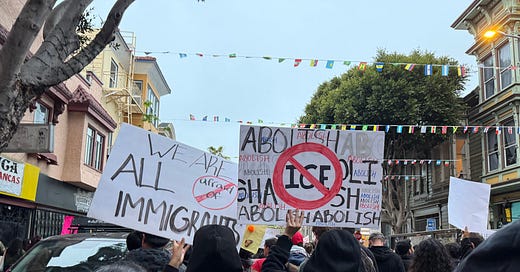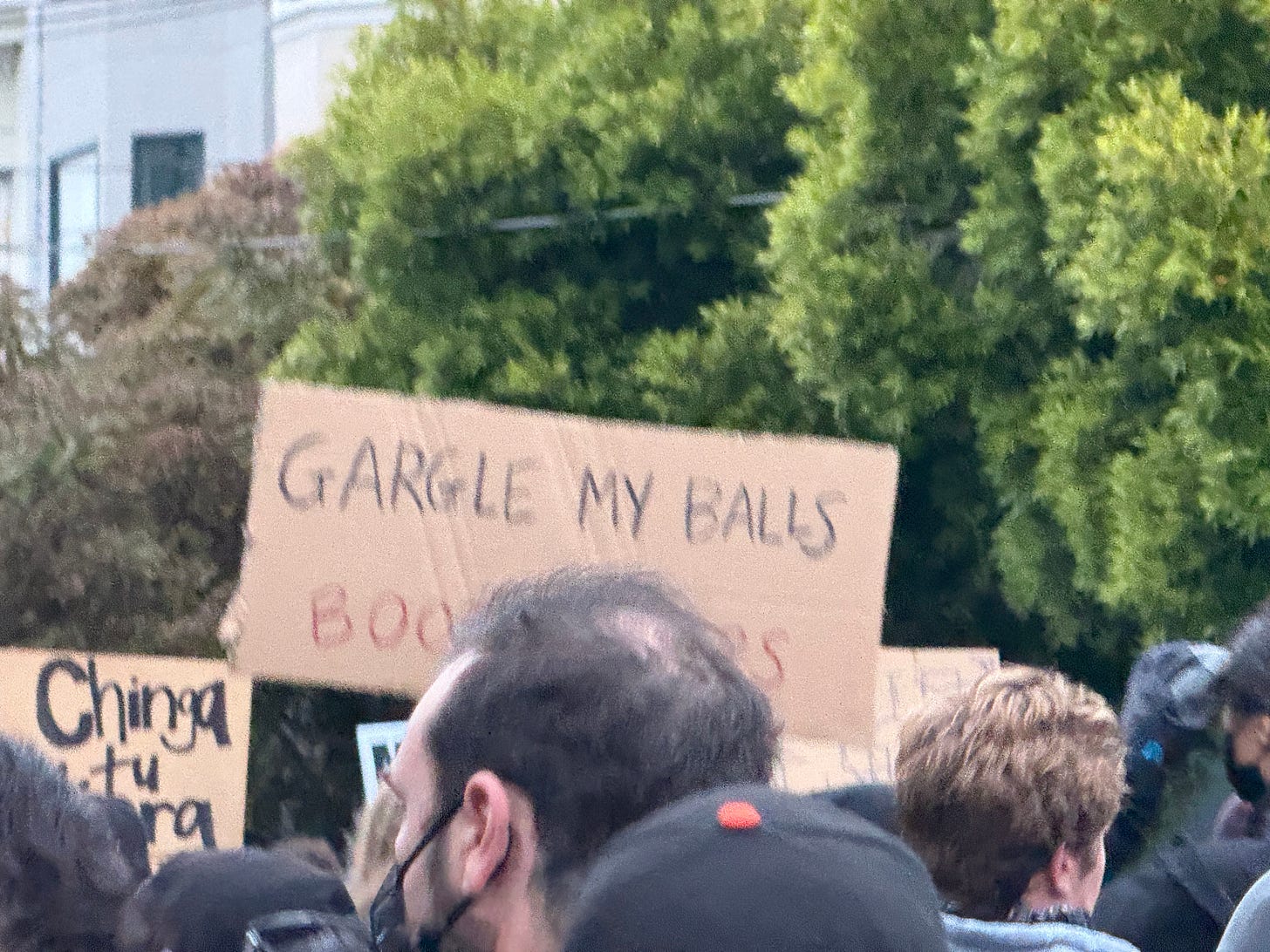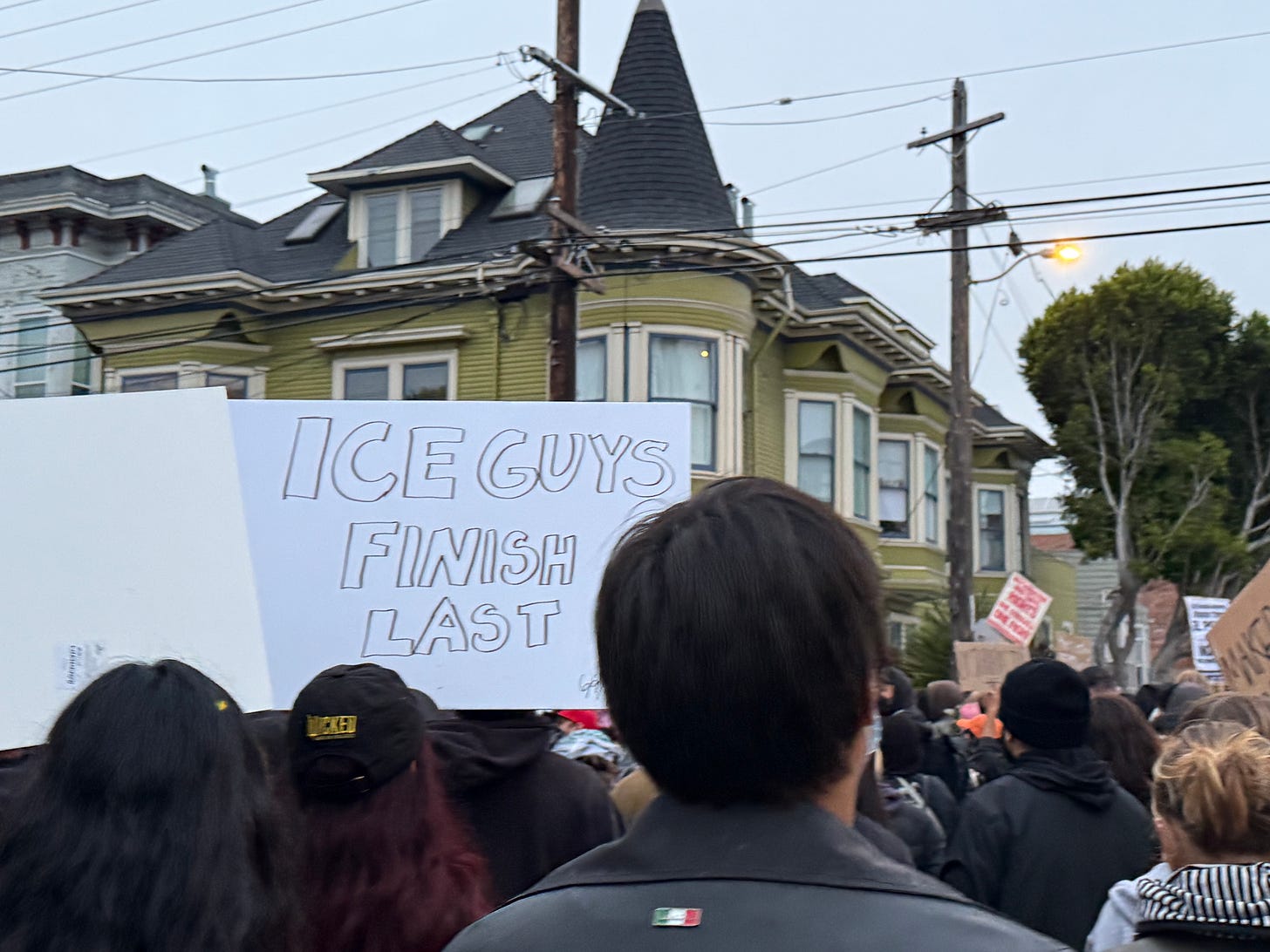Last night I stumbled into a protest march against ICE in the Mission District of San Francisco. The neighborhood is historically latinx and home to Calle 24 Latino Cultural District, Precita Eyes, and other non-white centering organizations. As I walked with the protestors screaming chants about fuck ICE, and ACAB and shame on gentrification, I felt a combination of pride to be in the mix and doubt that our efforts will produce results.
The main goal with protests is to spark the imagination about how to be of service, fire up people’s passion for justice, and remind everyone they are part of a community of like-minded thinkers. Protests are to show displeasure and do it with numbers that say, Pay attention, lawmakers.
There are the puns, and occasionally funny costumes. There are signs like one I saw last night that are dumb and purely irreverent. It said, “Gargle my balls,” not exactly striking a chord of diplomacy. It wasn’t even clear who was supposed to gargle said balls, but the message nevertheless fit with the atmosphere of rebellion. And how great is it to live in a country where you can make vulgar comments directed at the government without major retribution?
But besides protests building a sense of shared value and agency that hopefully translates elsewhere, and showing lawmakers their constituents care, what else do protests do? They don’t directly pass laws. At times they end in violence, graffiti, or damage to neighborhood businesses that nobody from the neighborhood wants or benefits from - usually done by opportunitists or people from “the other side” or out-of-towners. The damage from the George Floyd riots still hasn’t been repaired in parts of Minneapolis. So wouldn’t it just be better to wait until November and vote, or write a letter to the editor?
This is going to make me sound like a curmudgeon but these were the thoughts I mulled over last night as I tried to get carried by the spirit of the march. Like many, I felt disillusioned after the pussy hat movement and all the Women’s Marches in 2017 which were only followed by a disappointing 2nd term of Trump, and a seemingly more conservative Democratic Party. After the 2024 election and the lack of voter turnout for the Dems, I decided that protests are out. Law degrees and fighting it out in court are in. Performative actions on Instagram, or elsewhere, are out. Concrete action is in.
I know this sounds like the equivalent of an old dude yelling, Get a job, you hippies! but in November 2024, showing up to yell into the void did not seem like enough. We have to do something to effect change- especially if “activism” meant that people weren’t going to vote within a two-party system, I thought. During those first months after the results came in, I looked into what it would take to become a lawyer and am still not convinced I won’t apply to law school. Student loans have kept me from it so far. Maybe just a refresher course in the history of Supreme Court rulings or something.
These feelings that protests were no longer as useful as they once were continued to keep me from participating or seeing value in them- that is until the government began cracking down on our first-amendment right to peacefully protest. Right now our President has called the LA protests against ICE an insurrection and has called in the Marines, a move that is legal, but unethical.
This along with other recent red flags, like peaceful protestors getting arrested and tear-gassed, politically-minded Instagramers getting held for questioning at airports, and journalists getting uninvited from the White House or just yesterday, shot with rubber bullets - these line-crossings have caught my attention and melted some of the ice in my heart that kept me from truly believing in our collective power.
I think for me to appreciate the value of protesting it was important to take in these transgressions and consider what life in America would be like if we were not allowed to protest, not allowed to make funny signs and wave them in the streets, and not allowed to disagree with the government in public. It helped me to imagine times when people just rolled over and made the unimaginable their status quo. It seems obvious now and perhaps always will in hindsight, but the opposite of protests is why protests are important. Losing rights makes it clear why rights are important.
With that, there are many ways to contribute or make your displeasure known, and I hope you are all finding ways to fight back that give you hope.
Inspired by Martha Beck’s book Way of Integrity, I wanted to share a poem that I wrote while feeling overwhelmed. The exercise she presented in the book she got from Byron Katie, but the main premise is you take your feelings of stress, anger, overwhelm, etc, and turn them around. Specifically you articulate them and then move the words around until they change meaning. At some point, the hope is, the feeling will lose its charge and you will dissolve what had previously felt really real.
I’m lost at sea
I’m found at sea
The sea has found me
The lost see me
The sea is lost in me
The sea is found is me






The Declaration of Independence was the American OG form of protest against the King, and the right to protest was basically like a non-negotiable—hence 1st amendment— when the founding fathers were drafting up the Constitution. In my brief intro to law class before my concussion got the best of my student self, my takeaway from it was that to rebel and fight for EQUALITY as a collective *is* the spirit of this nation; collective power for THE PEOPLE. And yes, love your bit about concrete action! We need both.